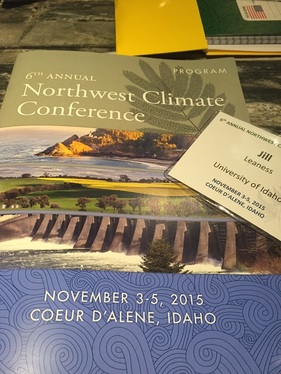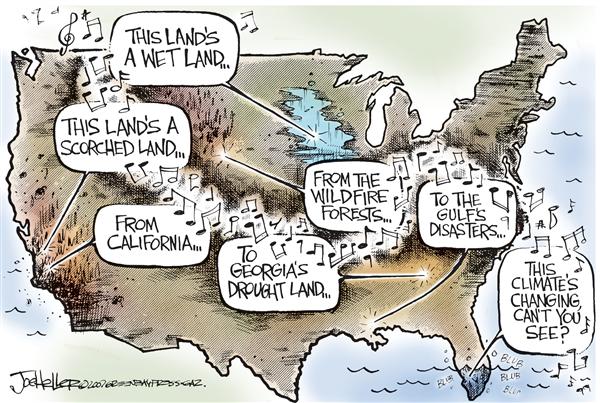 This week I had the privilege of attending the Northwest Climate Conference. The conference changes location every year (across the Northwest United States), and this year it was in northern Idaho. While I am currently attending the University of Idaho, I am not originally from this area, in fact I am originally from the northeast, a suburb of Philadelphia to be exact. What, you may wonder, does my hometown have to do with my experience at a conference about climate change? Well, ever since coming to Idaho, I have learned and seen very different perspectives on natural resources than I learned as a child in Pennsylvania public school and as an undergrad in New Jersey. Nowhere, has this different perspective been more prevalent than at the Climate Conference. Now, don't get me wrong, this was still a climate change conference, it was a combination of scientists, managers, students, tribal leaders etc that all care about and have a passion for understanding climate change. BUT what was very evident to me at this conference was the different motivators people in this part of the country have to stop climate change. For example, the opening speaker at the conference spent his hour at the podium presenting why climate change will negatively impact recreational hunters and fishermen. He explained how elk would be harder to find because they will move to higher elevations, how cold water fish such as steelhead will decline. He made extremely relevant and valid points about the ecological impacts of climate change, but all under the guise that we should put an end to climate change so we can continue to hunt and fish. I am not saying this perspective is right or wrong, and honestly in the end it doesn't matter WHY a person wants to take action to stop climate change, just that he or she DOES take action, but I can't say I expected someone to discuss hunting and fishing at a climate change conference led by academics. Some topics I did expect, but also coincide a lot more with northwest concerns than northeast concerns were wildfires and water resource issues. But, what am I trying to get at here? What I'm trying to convey, is that climate change is impacting the different regions of the United States distinctly and we, as individuals, are each experiencing the effects in varying ways, depending on how we were raised. If you were raised hunting and fly fishing you will be impacted by the loss of the species you hunt and fish for. If you grew up an avid skier you will be disappointed when your favorite slopes lack snow. But in the end it doesn't matter WHAT you notice first, or WHAT motivates you, what matters is that you acknowledge climate change is impacting your life, and that it is time to do something about it.
4 Comments
Prairie Problems
6/11/2015 03:08:14 pm
I think because there is such a variety of ways that climate affects people it's difficult to see the big picture. I am not a hunter or fisher, so I don't see those changes. I am not a skier, so I don't see those changes. I have "fish-eye" syndrome where I only see the changes that affect me. It is quite a challenge to get everyone is see the big picture - the picture that includes everyone's own unique "fish-eye" viewpoint. I challenge you to keep on that path. Keep sharing those viewpoints, so that eventually the big picture is the only picture that people understand.
Reply
Logan Aument
17/11/2015 02:09:01 pm
I never really thought about how the climate change can affect a different array of people. It is interesting to see that the hunters and fishers would be affected. The first thing i think about with climate change is the extreme temperatures that happen around the world.
Reply
21/11/2015 09:37:39 am
Hello Jill Leaness,
Reply
Sana Uddin
16/8/2022 07:59:21 am
Hi,
Reply
Leave a Reply. |
Categories
All
Archives
March 2024
|

 RSS Feed
RSS Feed
